Expert’s Rating
Pros
- Great performance for a wide array of tasks
- Big, high-res, fast refreshing screen
- Good quality metal build
- Convenient, fast fingerprint reader
- Reasonable price
- Good battery life
Cons
- Skimps on ports
- Gets warm to the touch and loud under load
- Heavy, big power brick needed for high performance scenarios
Our Verdict
Great battery life and respectable graphics collide in this affordable Dell. It’s a very good laptop.
Price When Reviewed
$1,249.99
Best Prices Today: Dell Inspiron Plus 16 7630
$1249.99
Dell’s Inspiron lineup is typically where you’d find its machines that are aimed at the average Jane or Joe, with modern performance and maybe even some features that have trickled down from the higher-end XPS computers. But this Inspiron 16 Plus 7630, new for 2023, is a different beast.
This new machine tries to split the difference between the premium XPS 15 and a typical Inspiron with a big display. What it throws in to sweeten the pot is an honest-to-goodness Nvidia graphics chip. But is this machine a jack of all trades or a master of none? Read on to learn more
Design & Build
There’s one area where Dell excels in the mid-range – it’s got some well-built machines for the money. The Inspiron 16 Plus is no exception, with its mostly-aluminium build, save for the black plastic bezel around the display. The design is a little generic, but it’s not one that is unattractive. On a desk, the chassis feels solid to type on without any bounce or flex.
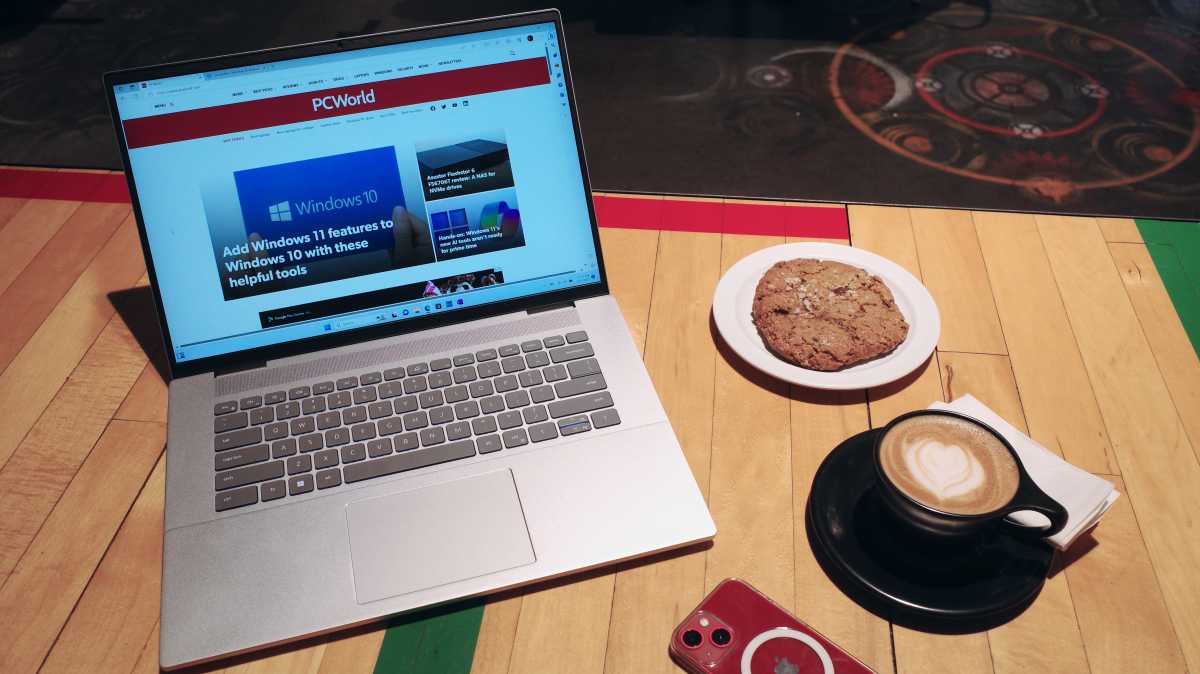
IDG / Brendan Nystedt
Due to the hot components inside, the Inspiron has a ton of vents you’ll notice immediately, with vents along the sides, back, and bottom. In order to get cool air into the system, the rear of the display pops the laptop up just a tad at the back. All of this said, the all-metal build makes it so you might feel the heat if you’re throwing intensive tasks or games at the system. While never burning hot, this thing absolutely gets toasty.
Connectivity
You’d think in a big 16in laptop, you’d get a lot of ports, right? Well, with the Inspiron 16 Plus, not so much. This computer is so dedicated to keeping its hot internals cool that you’re left with only a handful of ports.
Thankfully, there’s a Thunderbolt 4 port, which can be adapted into a ton of different ports or used to dock with a single cord. Just be sure your dock can charge at a rate of 130W due to the Inspiron 16 Plus’s power-hungry chips.
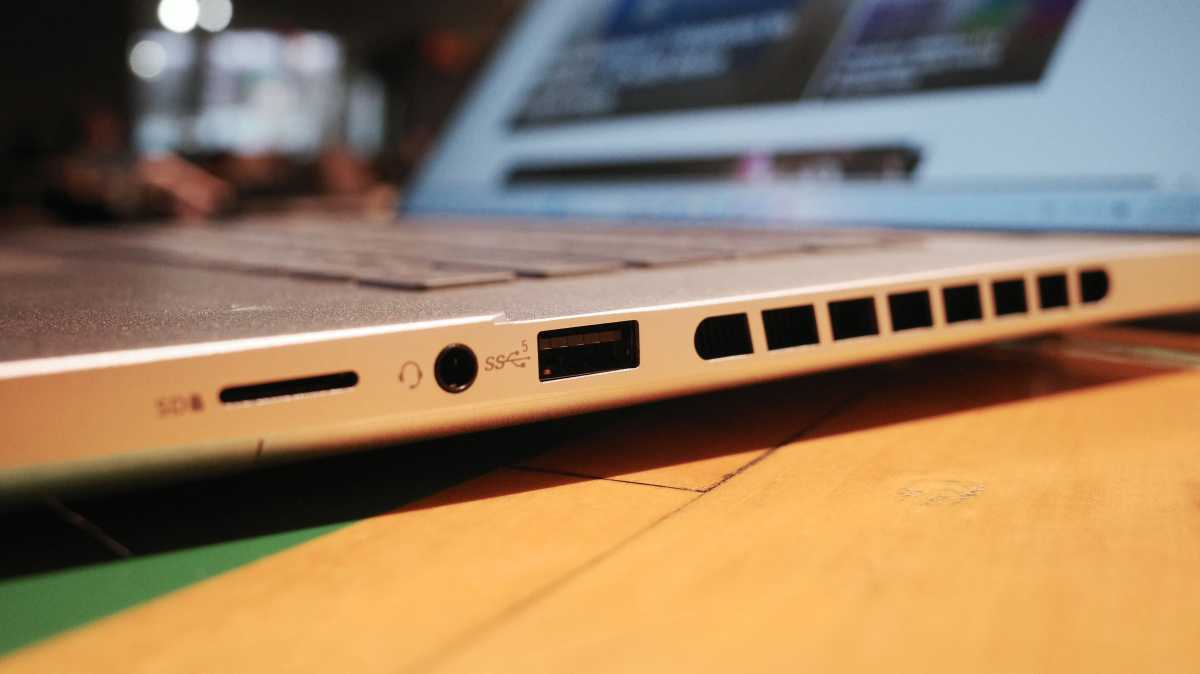
IDG / Brendan Nystedt
Otherwise, you’re left with a pair of USB-A ports at 10Gbps speeds, an HDMI 2.0, a 3.5mm headset jack, and, at least in models with the Nvidia 4060 GPU, a microSD slot. That last option is swapped out for a full-size SD slot in lower-spec Inspiron 16 Plus models, according to Dell’s website.
Wireless connectivity is top-tier, with Wi-Fi 6E and Bluetooth 5.1 using Intel’s AX211 chip. And although I noticed weak signal in the corner of my apartment, many other devices hit this snag, so I can’t ding the Dell too much for this shortcoming.
Keyboard & Trackpad
Dell redesigned its keyboards a bunch of times over the years, so it’s not afraid to experiment. Thankfully, the keyboard you get in the Inspiron 16 Plus is very nice to use and doesn’t mess with your expectations too much.
Key travel is satisfying and although I’ve used more responsive keys, these are totally usable and I was off and typing at high speeds in no time. One nice touch is that the keyboard hides the standard fingerprint reader in the power button, making it a short reach to press and activate a Windows Hello log-on.

IDG / Brendan Nystedt
The big trackpad works pretty well on the whole, and the fact that it’s a super slick piece of glass makes it feel nice to use right away. Like with all big Precision touchpads, though, I occasionally run into palm detection issues where I turn around and all of a sudden my cursor’s moved to an entirely different spot in a document when I start typing again.
Display, Webcam & Speakers
Other than the smokin’ fast Intel CPU and ray tracing Nvidia GPU, I’d say the other co-star here is the Inspiron 16 Plus’s high-res (2550×1600), high refresh screen with super skinny bezels.
Plus, since it’s a slightly-taller 16:10 widescreen shape, I never felt lacking for screen space, making for a nice café working experience with two windows snapped side-by-side.
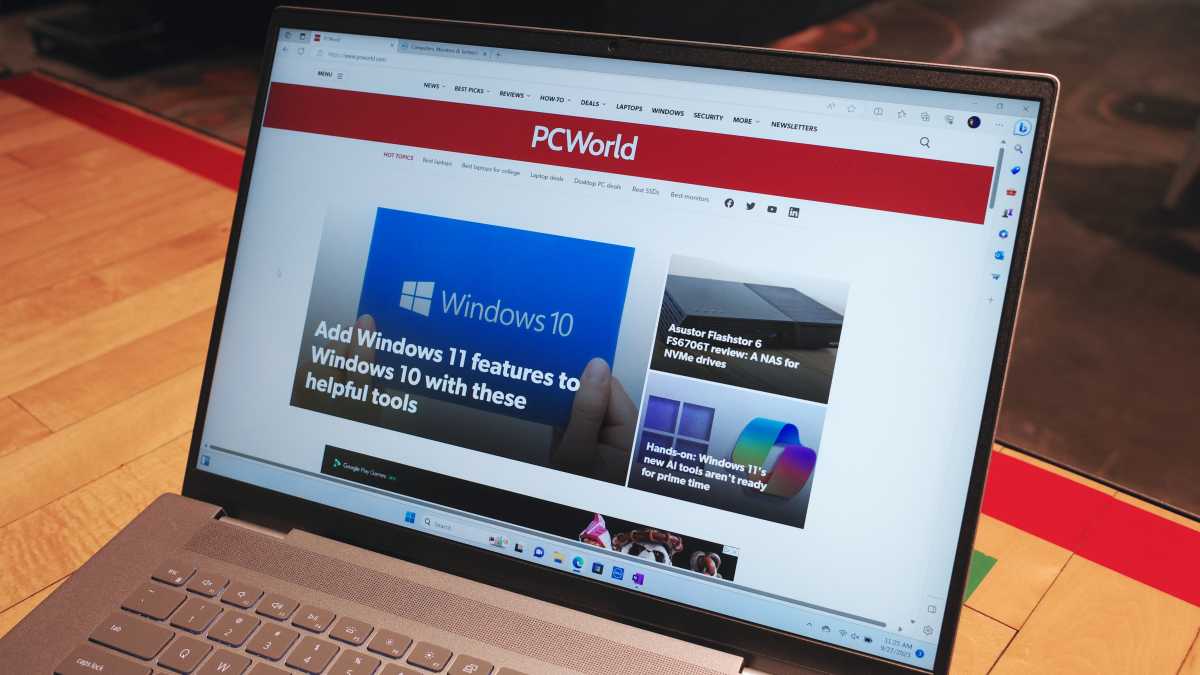
IDG / Brendan Nystedt
Sure, it’s not a touchscreen and it’s only available in a matte finish (which, personally, I prefer) but it’s an IPS panel that’s colourful and gets fairly bright. By default, the screen can ramp up from the standard 60Hz refresh all the way to 120Hz, to give actions like scrolling a super-smooth look.
Of course, for gaming, this is handy for titles that benefit from quick reactions. The more frames you can see, the faster you’ll be able to lock on to your target.
Dell’s put a pretty solid webcam inside the Inspiron 16 Plus. When I tried it, it kept my face well exposed, even with challenging lighting from behind and above me. It’s only a 1080p sensor, but looked sharp enough to my eye, picking up plenty of detail without much blotchy noise. The webcam also has a physical privacy shutter, which I’ll always prefer to an electronic switch.
Dell’s put a quad-speaker system into the Inspiron 16 Plus, and it can get loud when you really crank it up. But when watching the trailer for sci-fi movie The Creator, the sound really fell apart, lacking punch and making the dialogue sound somewhat crunchy.
In contrast, the Dell XPS series has way better speakers and a MacBook Pro 14in I compared the Dell to had a far more satisfying detailed sound stage.
Dell Inspiron 16 Plus: Performance
With its 20-thread Intel Core i7-13700H chip, the Inspiron 16 Plus comes at tasks with an amount of power unthinkable in a mobile system a decade ago.
Needless to say, it’s overkill for normal office-type work, but if you need extra oomph for media production or if you game occasionally, it’s got the goods. The only drawback is that this turbo-clocked 5GHz chip can rev all the way up to 115W if needed, sending the Inspiron 16 Plus’s fans spinning into overdrive to get rid of the heat.
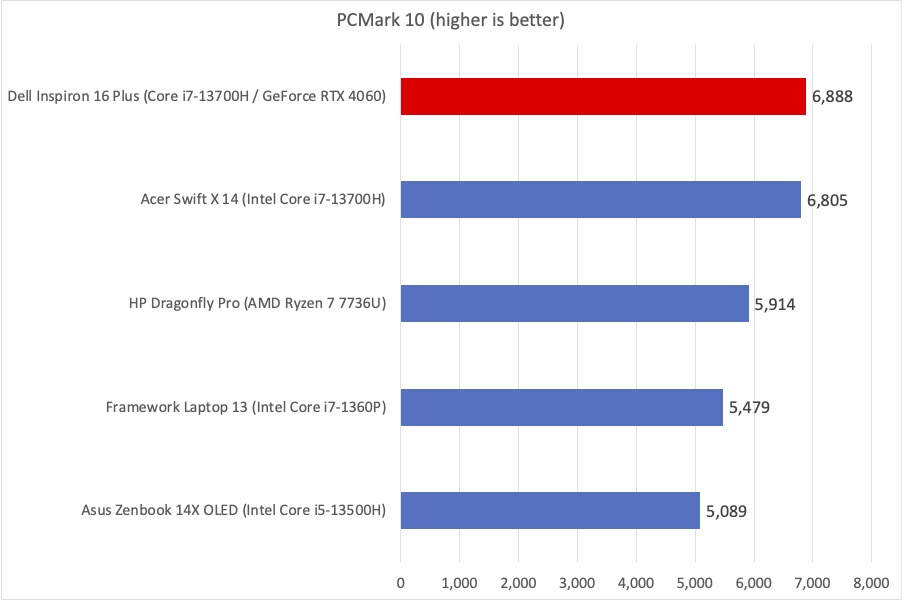
IDG / Brendan Nystedt
We use the PCMark 10 benchmark to get an overall picture of a laptop’s performance in typical tasks – office use, web browsing, and even video conferencing are used to simulate the work a computer. Given its performance-focused power profile, the i7 inside the Inspiron 16 Plus had no problems passing this test with flying colours. If you’re a college student looking for a computer that can take care of schoolwork and some gaming, this might be a great pick for you.
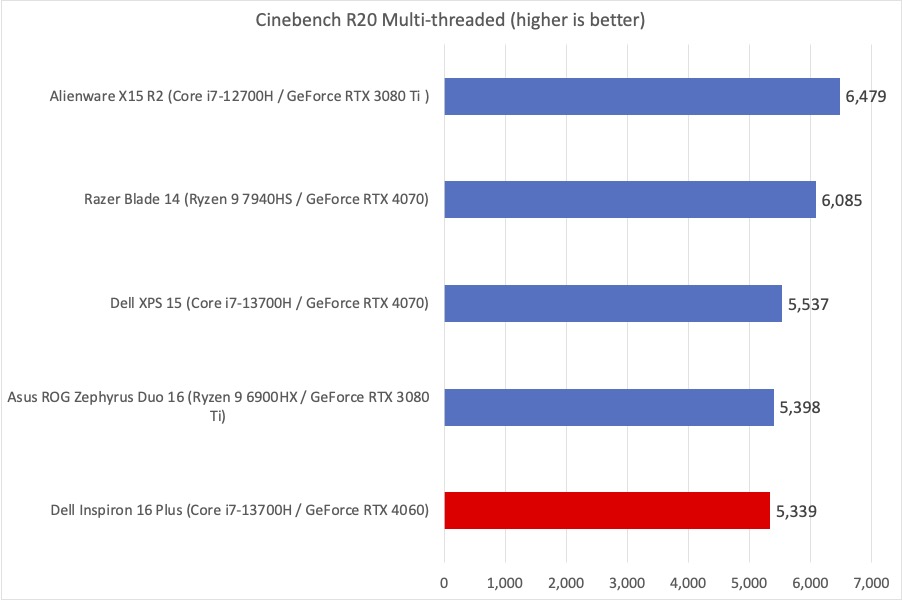
IDG / Brendan Nystedt
Using Cinebench R20, we can take a look at a laptop’s performance rendering a 3D model. This can help us gauge how well all the machine’s processor cores work together to accomplish a demanding task. Here, we can see that the Intel i7-13700H in the Inspiron 16 Plus holds its own, but lags behind more expensive laptops that are designed exclusively for intense, sustained workloads.
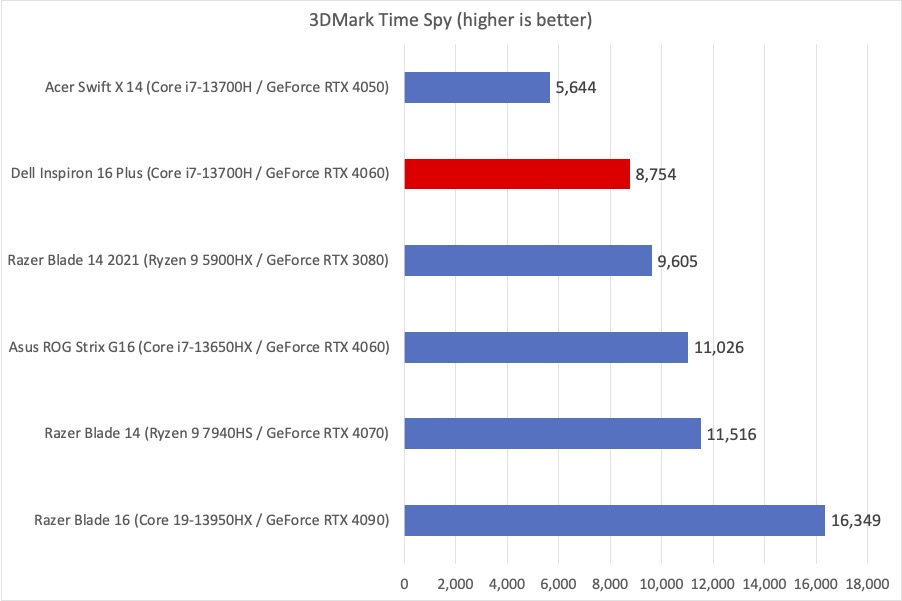
IDG / Brendan Nystedt
Although the Inspiron 16 Plus can be equipped without one, the model we tried packs a modern Nvidia GPU inside. In this case, it’s the GeForce RTX 4060, with ray tracing capabilities and all.
While not as powerful as the chip inside desktops sporting the same name, it helped this Inspiron turn in good numbers in our 3DMark test. It’s not bleeding edge laptop performance, but you’re getting just about performance close to that from the 2021 Razer Blade 14, at one heck of a discount.
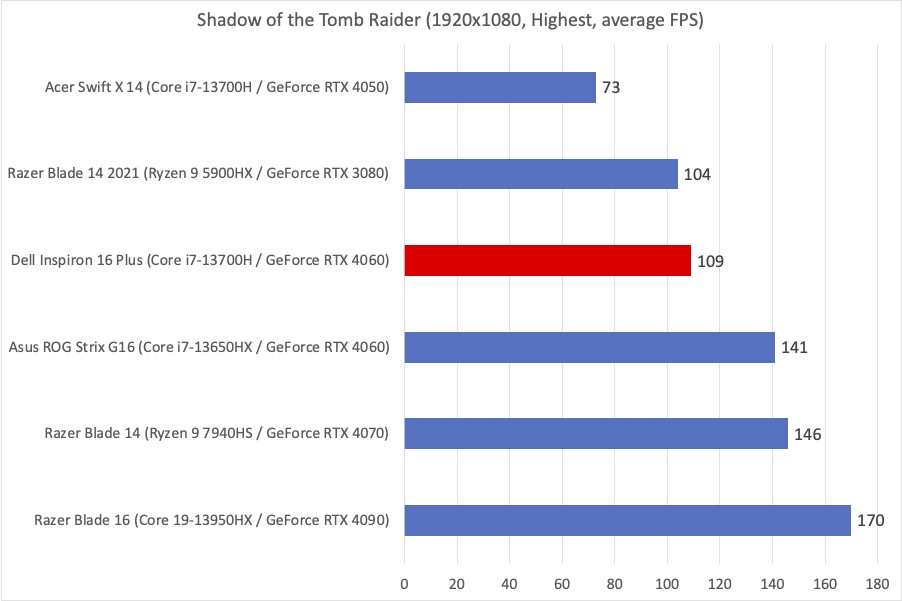
IDG / Brendan Nystedt
While it’s a loser when stacked up against recent gaming laptops, we think that getting around 109 frames in the Shadow of the Tomb Raider test is quite respectable. It might not push hundreds of frames of eye-cuttingly sharp 4K graphics in a 2023 AAA game, but it should be able to give you plenty of great gaming on the go. Note that the Acer Swift X has a slightly weaker GeForce GPU that’s limited to running with lower power than the chip inside the Dell, hence the significantly lower performance.
To try out the Inspiron’s real-world gaming performance, I loaded up Cyberpunk 2077 for a playtest. While I never got more than 55 FPS in any one setting, it’s possible to play this game with nice-looking graphics at a solid 30 FPS at the screen’s native resolution with the Ray Tracing: Ultra preset. Overall, I came away impressed with this Dell’s ability to handle the games I threw at it.
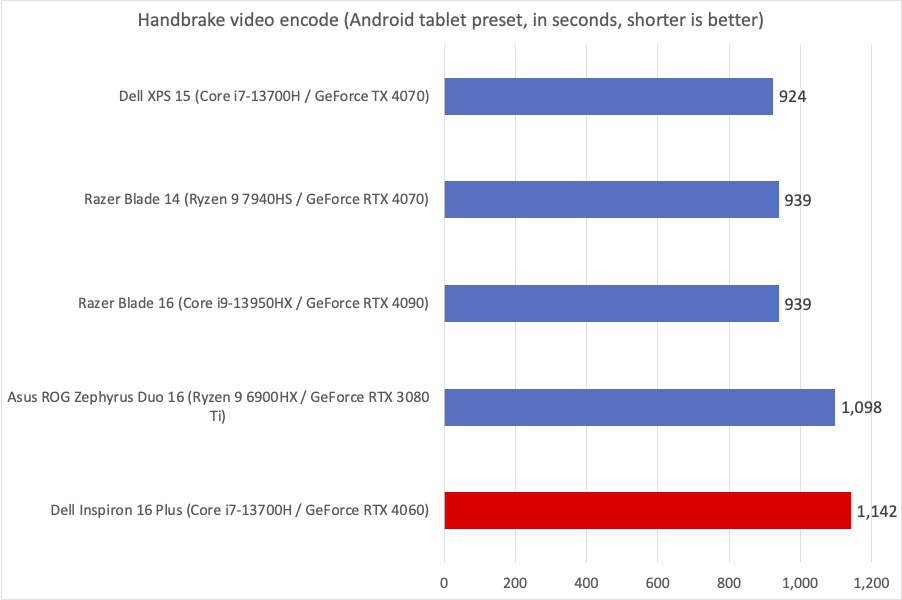
IDG / Brendan Nystedt
Finally, in our benchmarks, we run every laptop through a Handbrake video compression scenario. This lets us clock how long it takes to crunch a full-resolution HD movie into one suited for an Android tablet. In this test, the 20-core Inspiron 16 Plus put in solid work, even if it was slightly behind other Intel H-class processors.
Battery Life
As part of our battery of tests (pun intended) we loop a 4K video on every system to see how long it lasts on a single charge. Thanks to Intel’s efficiency cores and the big 86Wh cell inside the Inspiron 16 Plus, we clocked it at over 11 and a half hours.
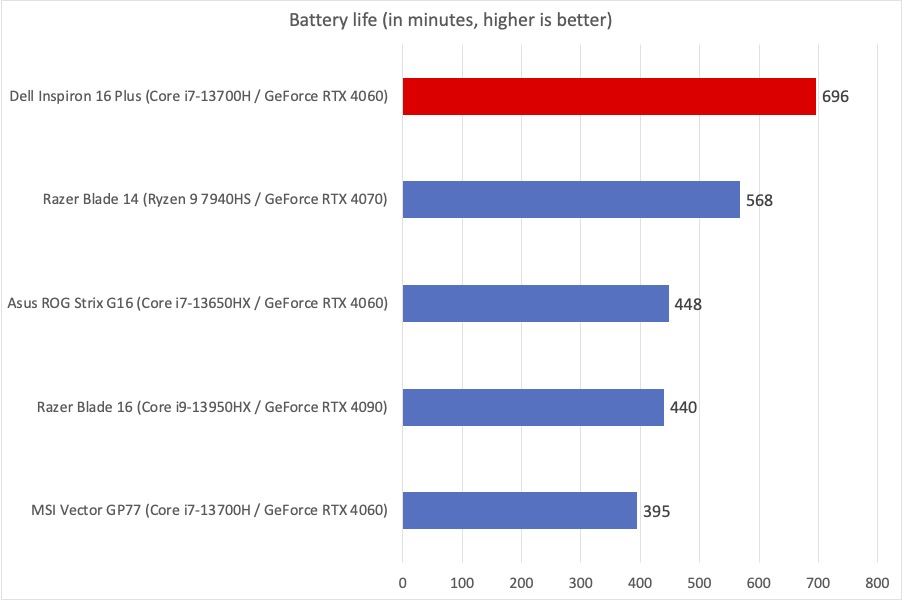
IDG / Brendan Nystedt
That puts it in normal ultrabook territory, and means it beats all the gaming laptops we’ve compared it to above. Anecdotally, I noticed around 12% battery drain during an hour of my typical workflow writing in OneNote, with a handful of Edge tabs open and YouTube playing in the background.
Should you buy the Dell Inspiron 16 Plus?
On paper, the Dell Inspiron 16 Plus almost seems too good to be true – does this big metal notebook really offer this much performance for a relatively affordable price? Where’s the catch?
Well, at least during our time with this laptop, we can say that other than it getting really toasty and loud under load, there really isn’t a catch.
If you’re looking for a powerful new laptop that can pull double duty playing games, then the Inspiron 16 Plus does a good job – as long as you don’t need cutting-edge performance. It can even give you all-day battery life for work scenarios, assuming you’re not a professional gamer, of course.
Dell’s put together a machine that feels like it could cost a whole lot more, and that gives premium systems (even Dell’s own XPS 15 and the pricier Razer Blade devices) a run for their money.
Specs
Here’s the specs of the specific model reviewed, but other configurations are available:
- CPU: Intel Core i7-13700H (14 cores, 20 threads: 6 performance, 8 efficiency)
- Memory: 16 GB DDR5 RAM
- Graphics/GPU: Nvidia GeForce RTX 4060, 8 GB GDDR6 VRAM
- Display: 16-inch 16:10 2.5K (2560×1600) antiglare IPS screen
- Storage: 1 TB M.2 NVMe PCIe solid state drive
- Webcam: 1080p with physical privacy shutter
- Connectivity: 1x Thunderbolt 4, 2x USB-A 3.2 Gen 1 (1x always-on charging), 1x HDMI 2.0, 1x 3.5mm combo audio, 1x DC-in barrel plug
- Networking: Wi-Fi 6E, Bluetooth 5.2
- Biometrics: Fingerprint reader
- Battery capacity: 86Wh
- Dimensions: 14.05 (W) x 9.92 (D) x 0.79 (H) inches
- Weight: 4.54 pounds, 5.56 pounds with AC adapter
- Price as Reviewed: $1,649.99
This article originally appeared on PCWorld.
